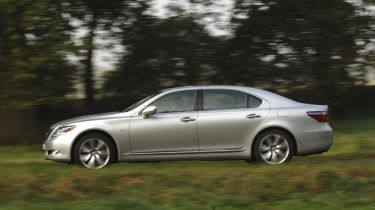Lexus LS600h L
Even though it’s the flagship of the Lexus range, the LS600h isn’t a car that shouts about its status.
It shares the subtle shape of the standard LS, and is only set apart by the LED lights, a transparent blue coating on the badge and discreet hybrid logos. While some buyers will love this, for many it’s likely to be too conservative.
The longer wheelbase of our test car doesn’t make it stand out any more, although passengers behind the driver will appreciate the extra 120mm length and significant improvement in rear space.
Our model was fitted with the optional back seat relaxation pack, which takes the price up to £88,000, and allows you to recline, extend a footrest and enjoy a massage. With a central control box for the audio and climate systems, plus a pop-down DVD screen, the LS is certainly a great car if you’re being driven around.
As you would expect in a Lexus, the quality of the interior is faultless – the cabin is impeccably trimmed, and fit and finish is superb. But while there is very little to criticise on a technical level, the LS’s cabin doesn’t manage to generate the sheer sense of occasion that’s apparent in the A8.
The driving position is also flawed. There’s nothing wrong with the sumptuous seat, but it doesn’t adjust low enough, and the amount of steering adjustment is far from sufficient.
However, mechanical refinement is unrivalled. Road and engine noise is remarkably subdued – a reading of 63dB at 70mph is one of the lowest we’ve recorded this year – and the hybrid drive functions have been meticulously integrated.
You need never be aware you’re driving a petrol-electric car. In traffic, the 5.0-litre V8 stops and starts with no more than a murmur, and at low speeds, the switch between power sources is utterly seamless. With the battery producing maximum torque at all times, acceleration is amazingly smooth and linear.
But the LS wasn’t as fast as we expected. The hybrid system develops 439bhp, yet it didn’t accelerate any quicker than the Audi. This is largely due to the fact the Lexus weighs 465kg more, at 2,410kg. Still, if you look beyond the seven-second 0-60mph time, the LS is still a rapid car that builds speed effortlessly.
Where it really falls down is on a key part of its claimed benefits. Unless you treat it incredibly gently, you’ll never get close to Lexus’s claimed economy figure of 30.4mpg – we managed only 19.4mpg over the course of 1,100 miles.
Nor is the LS600h a dynamic masterpiece. Away from its natural environment (motorway cruising or silent city driving), the Lexus comes a little unstuck. On twisty A-roads, the combination of weight, light steering and size make it cumbersome. Thanks to its four-wheel drive, active air-suspension and stability control, the Lexus never feels unsafe, it just lacks sharpness.
The electro-hydraulic brakes also take some getting used to. We found it hard to bring the LS to a halt progressively, as the pedal oscillates under your foot, causing the car to slow jerkily. The CVT transmission is far smoother, though, and aside from a small amount of tyre patter,
the saloon deals with rough roads beautifully.
Add this sublime comfort to the astonishing standard equipment and hi-tech underpinnings, and it’s clear to see why this is the ultimate Lexus. Just don’t buy one expecting to save the planet.
Details
Price: £83,645
Model tested: Lexus LS600h L
Chart position: 2
WHY: Following on from the hybrid RX and GS, this car tops the Lexus range. We test it in LWB guise.
Economy
After covering more than 1,000 miles, the LS600h’s average consumption was only 19.4mpg. This is highly disappointing from a car that claims to achieve 30.4mpg.
Residuals
Big executive saloons often suffer poor residual values. The LS600h is predicted to retain only 39.4 per cent of its new price, which means it will lose £50,689 over three years.
Servicing
Lexus topped the Driver Power 2007 dealer survey, so it’s known for its customer care. As the hybrid requires no maintenance, servicing costs the same as on an LS petrol, at £1,021 for three checks.
Tax
A CO2 figure of 219g/km places the Lexus hybrid five tax brackets lower than the Audi. But as the LS costs more, higher-rate fleet users shell out an extra £942 to run it, at £10,037.







